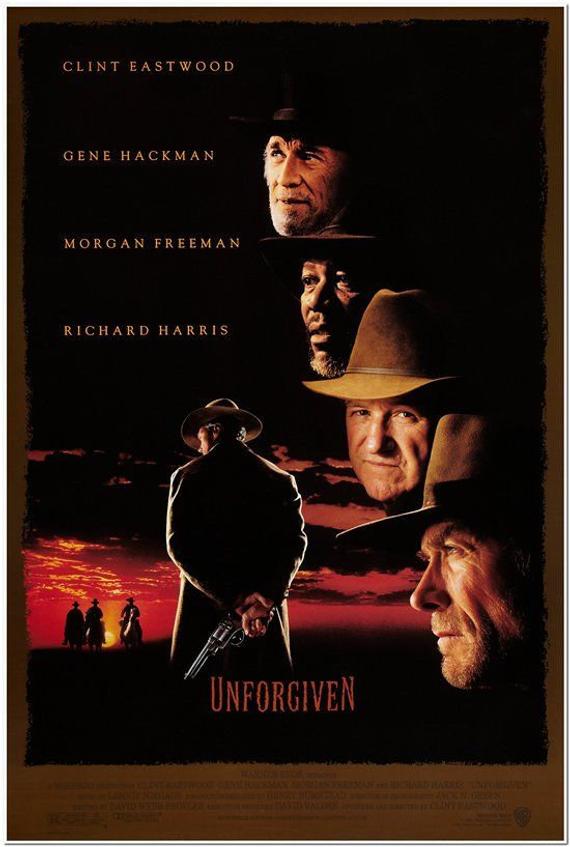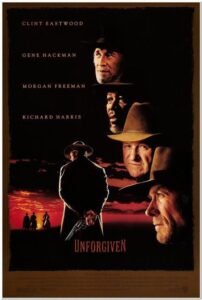MPAA Rating: R/ Genre: Western/ Stars: Clint Eastwood, Gene Hackman, Morgan Freeman, Richard Harris, Jaimz Woolvett, Saul Rubinek, Frances Fisher, Anna Thomson, Rob Campbell, Anthony James/ Runtime: 131 minutes
I feel it is safe to say that Ford, Leone, and Peckinpah are all legendary filmmakers who all managed to bring their own style to the time-honored genre of film that is the Western and help it evolve from nothing more than a smattering of low-budget and action-heavy movies into a true art form set against the backdrop the Old West in America and that delivered us riveting stories of heroes, tragedy, and absolutely incredible adventures. Suffice it to say then that I think it is safe to say that celebrated Hollywood icon Clint Eastwood might be, at this time, one of the if not the most familiar actor/director with this iconic genre. This is due not only to getting his start on TV’s Rawhide, but also because of his iconic role as the “Man With No Name” in Leone’s Dollars Trilogy, but also with work both behind and in front of the camera on such films as Pale Rider and Hang ‘Em High. However in the year 1992, Eastwood gave audiences a film that many consider the final truly serious Western as well as a masterpiece of the genre and its name is Unforgiven. Indeed as a riveting demolition of the Western mythos that came before it, I feel that Unforgiven will be the last true Western. Indeed since its release we have seen such iconic films as Tombstone, The Missing, or even 2016’s Magnificent Seven, but I still feel that Unforgiven will always still be the final page in the story. It’s not so much that those films aren’t Westerns because they are; rather it’s because the very essence of Unforgiven right from the first moments showing us a thin tree and solitary grave while haunting music plays in the background just seems to have the air of finality about it. Indeed the emotions that are brought out feel very much in the way of both far-away and quite uncertain ironically not that far-off from the cast of characters within the film. Yet the real brilliance on display here is that Eastwood doesn’t want us to grieve for this dying genre. Instead he, and the rest of the talented cast and crew he has assembled for this, would much prefer it if we all instead made the choice to sit and ponder. Not just on the film we just saw unfold, but also on the immense and epic history of everything that had led up to that point in what is a truly celebrated and legendary genre of film.
The plot is as follows: Unforgiven tells the tale of a man named William Munny. Munny is a man who used to be a ruthless and vicious killer, but who now is busy living a more peaceful life with his kids on a farm literally out in the middle of nowhere. Yet even after leaving his violent past behind, life is still quite the struggle for Munny and his family due to financial difficulties in the aftermath of the tragic demise of Munny’s wife. That all changes one day however when a young man who has christened himself “The Schofield Kid” appears trying to find Munny. The reason is because there is apparently a 1,000 dollar bounty being offered in a town known as Big Whisky for 2 cowboys who cut up a prostitute pretty bad, and The Kid wants to offer Will the chance to work alongside him and then split the bounty between them 50-50. Yet even though his days as a vicious killer are behind him, Munny decides to work with the kid after pondering the financial difficulties his farm is facing, but not before also recruiting an old friend named Ned to join the party as well. However it isn’t long before Will’s notoriety as a vicious and ruthless killer and robber return to haunt him. Thus with the ghosts and regrets of the past along for the ride, this unlikely trio sets off to the town of Big Whisky where a showdown not only with the town’s ruthless sheriff Little Bill, but also with destiny and the answer to the question of “what happens when a man of violence tips his toe back in that pond after a while away?” awaits……
Now even though he may more known for what he has contributed to the realm of science fiction, I still feel that this film’s screenplay courtesy of David Webb Peoples does manage to be an extremely realistic look at how life truly was in the Old West with particular regard to the concept of how violence in that time and place was both used and abused in equal measure. In fact, it is how violence is used by the characters and the ramifications of said violence that comes across as the main concept of the film’s narrative. Indeed that’s because whilst we see Munny and Ned are desperately trying to escape from the violence they once caused in horrifying amounts, the Kid feverishly waits for any opportunity necessary for him to show how much of a man he is by being violent. Thus it is this idea of the two-sided coin that is who a man really is and what the stories make him out to be that is really examined not only via the bond between Will and the Kid, but also by another character who is a writer of stories about the Old West and who idolizes the gunslinger and sees them as heroes of a sort only to get a brutal crash course in reality courtesy of Little Bill. Indeed this a phenomenally written screenplay that also manages to go in-depth into its cast of characters and the relationships between them. Thus what we are left with is a story that is pushed forward by the characters and feels also like a giant edit on every other Western that has come before it and which also takes time to really critique and throw under the microscope the violent aspects of a lot of those same films in the process.
Now the script may most certainly be this film’s spine, but it is the expert style of directing that Eastwood brings to the proceedings which really help this film evolve into the powerful pondering on both violence and how the Old West really was that the end product truly is. Indeed by utilizing a down-to-earth, but also quite resolute perspective that is very much in the same vein as the film’s script, Eastwood manages to show us a version of the Old West that has been stripped of its romanticism and myths thus giving us the most realistic Western I have seen in a long time. Also in the utilization of the script, Eastwood manages to take a critical stance on the idea of just what it means to be a “hero” in the Western genre by focusing on the gunslinger and their usage of violence in in order to solve the various conflicts they find themselves embroiled in. Indeed since the beginning of his film career where he played the seemingly mythical “Man With No Name” in the Dollars trilogy, I think it is quite apt that it is Eastwood who is exploring this idea. Indeed ever since he made his first Western rather than just starring in it, Eastwood has always showcased quite the curiosity in how a person can be both a hero and a villain with particular regard to the kind of protagonist first showcased in the iconic Western Shane from 1953. Indeed it is this kind of protagonist that Eastwood has managed to showcase before in films such High Plains Drifter or The Outlaw Josey Wales and it’s all been leading to his work here in Unforgiven. Indeed this film is perhaps the ultimate debunking of several concepts as well as Clint’s final bow on the Western stage. Indeed even though the film might seem a wee bit “preachy” here and there, the narrative is constructed in a manner that it doesn’t feel forced in any way and as such it manages to unfurl itself quite proudly as an iconic tale of the Old West.
Now the cast in this film is truly first rate. This starts with Clint pulling double duty as actor as well as director. Indeed in the lead role of William Munny, Clint is plain and simply spot-on in a role which, upon first glance, seems like it is nothing more than a continuation of his “Man With No Name” character. Yet make no mistake: this character has a name and he has a past he has tried desperately to run away from. Indeed Eastwood manages to showcase both senses of guilt and regret, but also rage and ferocity absolutely perfectly thus making this one of his finer understated roles. We also get wonderful work from Morgan Freeman who brings a voice of reasoning to his role of Munny’s friend Ned as well as from Jaimz Woolvett who brings a delightful sense of youthful arrogance to the role of aspiring gunslinger The Schofield Kid. Yet both of these wonderful performances still get completely trumped hook, line, and sinker by Gene Hackman’s phenomenal work as the brutal and animalistic yet also human sheriff of Big Whisky Little Bill Daggett. Indeed Hackman, before his retirement in 2004, was a true class act of an actor and in this it is no different as he manages to completely take over every single minute of screen time he is given and manages to show his phenomenal talent in a role that is both fascinating yet also brutal and animalistic at the same time. Finally we also get phenomenal work from the iconic actor Richard Harris in the smaller yet pivotal role of another aging gunslinger by the name of English Bob. Indeed in what amounts to 30 minutes of screen time give or take, Harris manages to show why he is one of the more terrific albeit severely underutilized actors out there. Yet even in the smaller roles such as Saul Rubinek as Bob’s chronicler and Frances Fisher as the mother hen of sorts of a brothel in town, there is both a passionate and intensity that it seems like Clint, instead of trying to find movie stars, focused on finding the best actors for the job and in that regard I would say he succeeded phenomenally well.
All in all it is safe to say that some of the more celebrated filmmakers in the world of the Western film have had their own distinct ways at how to approach the concept of acts of violence. Indeed whereas Leone focused more on the build-up to an act of violence and Peckinpah chose to focus on the act of violence through and through, Eastwood chooses to focus more on the immediate aftermath of a violent act and showcases for us just what exactly the gut-wrenching consequences of such an act. Indeed, as shown in this film, the West wasn’t always fun nor was it easy to tell the good people apart from the bad. Rather the West could be tragic, and could be quite dark and as for the people? Well I guess you could say that they were just as complex and complicated as ever…on a scale of 1-5 I give Unforgiven “92” a solid 4 out of 5.



